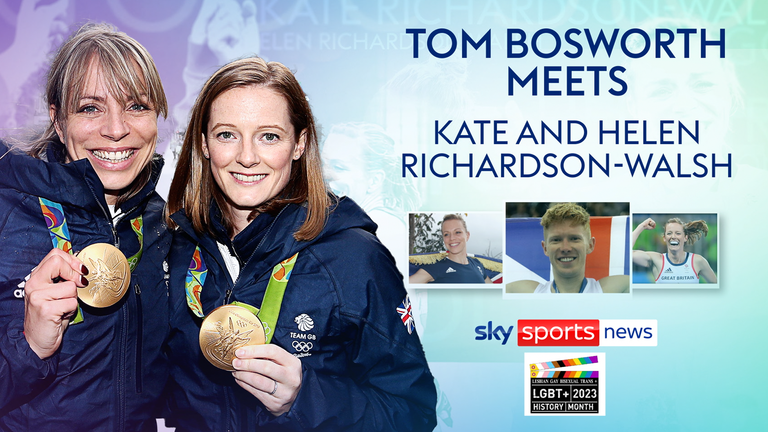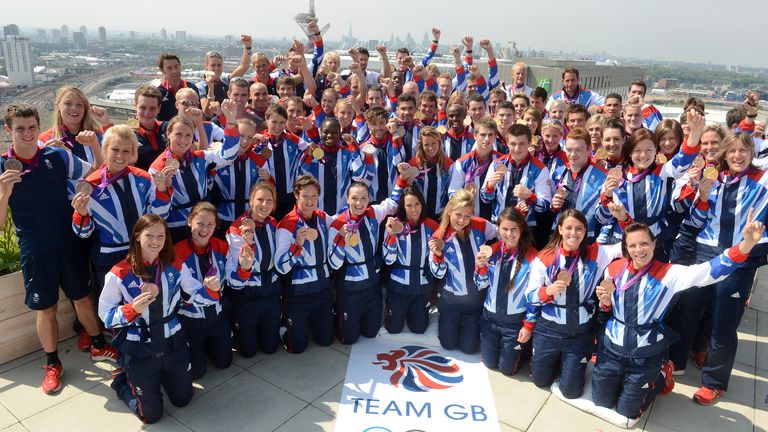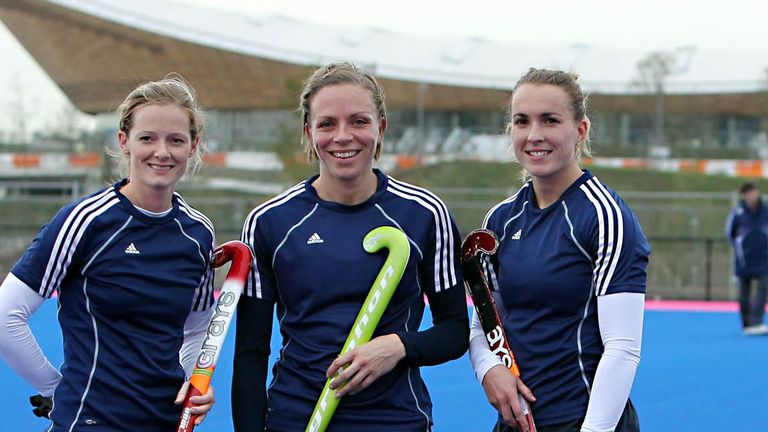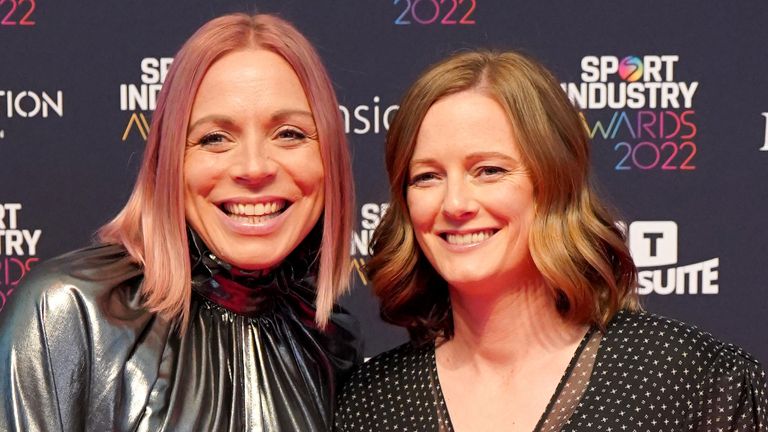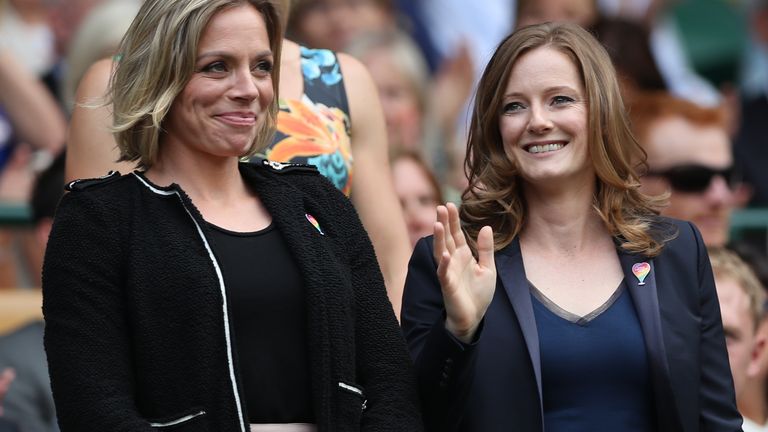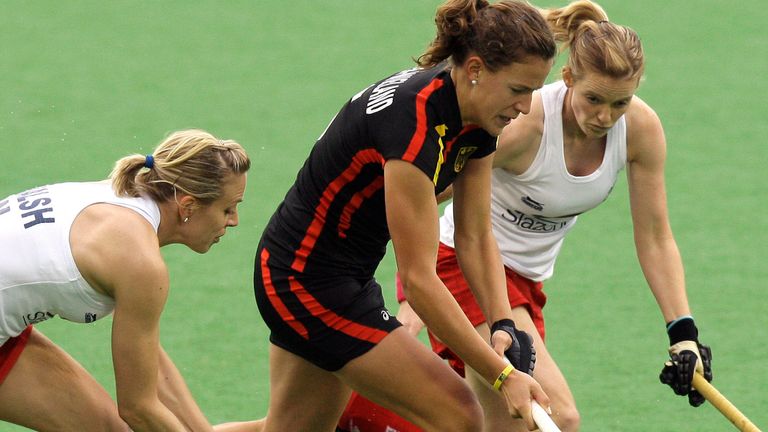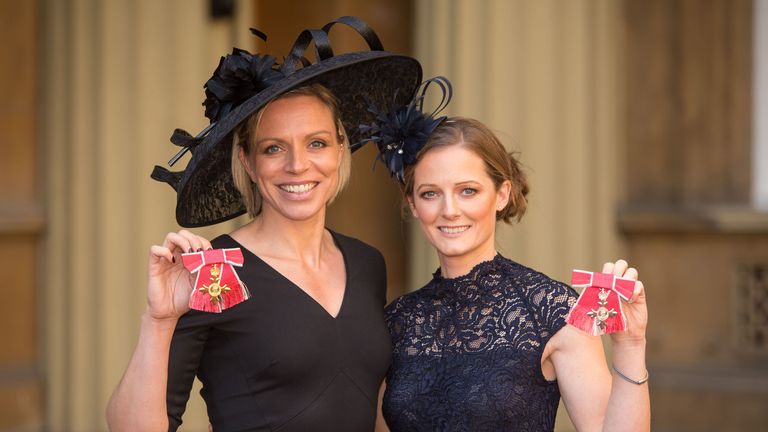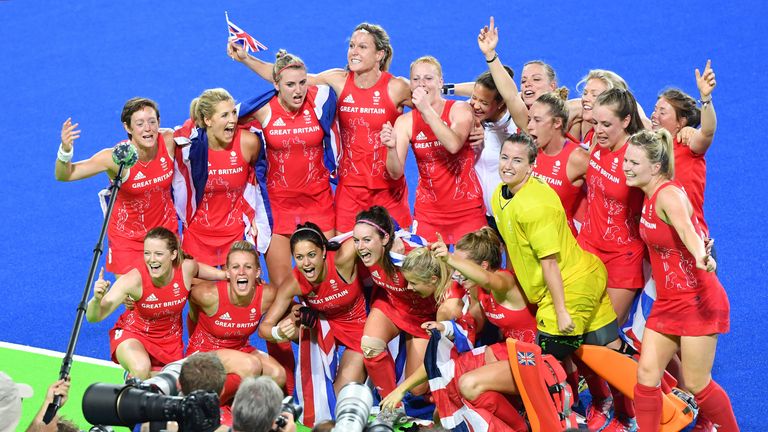Helen and Kate Richardson-Walsh: LGBT+ History Month has allowed us to ask the tough questions
Kate and Helen Richardson-Walsh were the first same-sex married couple to win Olympic gold when they helped Team GB to victory in Rio in 2016; The couple sat down with Tom Bosworth for Sky Sports as they discussed LGBTQ+ rights in sports and raising a child as a same-sex couple
Wednesday 1 February 2023 13:23, UK
Hockey legends Kate and Helen Richardson-Walsh became the first same-sex married couple to win an Olympic gold medal when Team GB won at the 2016 Olympics in Rio.
With almost 700 international caps between them, Helen and Kate have years of experience under their belts on the hockey field and have been pioneers of LGBTQ+ rights in sport.
At the start of LGBT+ History Month, the couple sat down with Tom Bosworth, an openly gay British race walking champion, where they discussed being a same-sex couple in a sports team, raising a child in lockdown, the importance of LGBT+ History Month and how sport can be more welcoming.
- Chelsea captain Azpilicueta on tackling comments against the LGBTQ+ community
- Megan Rapinoe on The HangOut
- Campbell Johnstone: New Zealand player first to come out as gay
'Trans rights in sports are nuanced'
Since retiring, Kate and Helen have taken up various roles with sports clubs and believe that sport has become more open and tolerant, but there is still a lot of work to do, especially around trans rights.
In recent years, various sporting institutions have responded to the participation of transgender women by adding eligibility requirements to women's sports at various levels.
Supporters of such regulation say it is necessary to ensure fairness and safety, but critics say the policies are discriminatory against transgender and intersex women.
Asked about how sports can address the issues surrounding trans athletes, Kate believes the surrounding conversation must come from a place of kindness and inclusivity.
"I do feel very strongly on this topic. It has to start from a place of inclusiveness, of equity and of kindness and of love," Kate said.
"I think that's gone completely missing in this whole topic of trans inclusion in sport. Sport is supposed to be for everybody, and we need to start from that premise. From there I think we can look at what it looks like in each sport, each level of that sport for each individual within that sport, actually.
"It's so nuanced. I think there needs to be more science. There needs to be more research and a lot of myth-busting and getting to the real facts of the issues."
Helen added: "So much of the technology and things that we used in the beginning of our career was based around male athletes because that's all the research is.
"I think research and education is absolutely where we must start, but it has to come. I think with that also with that kindness and inclusiveness and equity, because then I think we'll get good decisions and good decisions being made for everybody."
'Culture is defined by the worst behaviour tolerated'
Helen and Kate believe it is important to have important and honest conversations in order to change the culture in an institution, club or sport.
They think that it isn't up to individuals to lead the change, but the collective, and for people to call out negative behaviours.
Helen said: "It's for everybody that's involved. [Psychologist and former basketball player] John Amaechi says your culture is defined by the worst behaviour tolerated in yourself and others.
"We've had homophobic language in a team by a coach and I probably wouldn't have said anything, but Helen was brave enough to call it out at the time, and that's what it's going to take.
"Can you do it in a way that's not going to start a big row, you know, doesn't get violent or aggressive? It's a conversation."
Kate added: "It's also wider. It's not just about those men that are on the football pitch, it's the coaching staff, it's the physios, the medics, the fans, the administration people. It's every single person that works within male sport, feeling like they're accepted, and they can be part of that sport."
Both said that LGBT+ History Month has allowed them to have more open, positive conversations with peers and governing bodies.
Helen said: "It enabled us to ask the question of our governing body, and it just puts it on the table in a really nice, positive, conversational way.
"It gives all the options to get out on the table in a really positive and conversational way. That's why it is so important to have a conversation, whether it's in schools and companies or organisations."
Using sports psychology to raise a child
After retiring, Helen and Kate faced a different challenge when they decided to have a child. Pfeiffer was born in December 2019, three months before the UK was placed into a nationwide lockdown due to the first Covid outbreak.
They have both had to deal with the challenges of being same-sex parents and coping with difficulties in raising a newborn, but they have used the skills they learned in sports to help them.
"All the psychological tools we learn as athletes are absolutely going to play, particularly under fatigue, stress and pressure. And just how do you manage yourself? Are you able to still be calm, under pressure and patient?" Kate said.
"Our life has changed massively since Pfeiffer joined us three years ago, and it's been incredible. You know, she's amazing. We're very lucky to have her in our lives because there are lots of people who don't get the opportunity."
Helen added that it's been particularly hard to have a child as somebody from the LGBTQ+ community.
"You're having to go over extra barriers and there is a big financial implication. But for the majority of people, this is a postcode lottery of fertility treatment, and I think that's made it even harder if you're part of the LGBT community."
Kate and Helen also face questions about Pfeiffer having same-sex parents.
Helen said: "It's quite subtle. Sometimes there's a maybe an assumption like where's the dad? I think that is probably the major thing that I suppose we've come across.
"Maybe it's unsaid and it comes with a look and it's maybe a bit of a kind of a perception. We live in a heteronormative society and therefore, it's understandable. But I think it's sometimes bubbling under the surface."
Coupling up in a sports team
Before having a child, getting into a civil partnership and winning gold in Rio, Helen and Kate had to combat securing a place in the national hockey team while navigating the hurdles that come with a new relationship in a high-performance environment.
Kate said: "The relationship took us by surprise a little bit, initially, because we've been friends for a long time. Everybody was amazing and both of our families were very supportive.
"This was the first time I think we'd knowingly had a couple in the team and were openly talking about it. But we talked to the players, we talked to the coach, which is a bit awkward in the beginning, but actually really good.
"It's one of those things when you're starting out in a new relationship. You don't really want to be talking to the coach and the performance director and the chief executive of England hockey, but that was something that did happen, and actually, I think was actually really healthy and positive."
Helen added: "It allowed them to put any fears on the table. People did have some understandable worries and fears about what it was going to be like having a couple in the team and was it going to be divisive if we were arguing or if we broke up?"
Kate added that maybe these conversations aren't necessary anymore, and said being a couple in a team environment is now a "non-thing".
"It's just something that everyone's aware of, but it's not even a topic of conversation. And so I do feel like in certain sports and certain areas we have moved on massively," she said.
Helen added: "I still do question whether sometimes it is the easy option of not talking about it because we don't want to have that uncomfortable conversation.
"I just, I wonder whether sometimes we're still sweeping some things under the carpet and actually avoiding a hard conversation. For men - it's not really comparable. I think, you know, it's a very different journey for them to go on."
